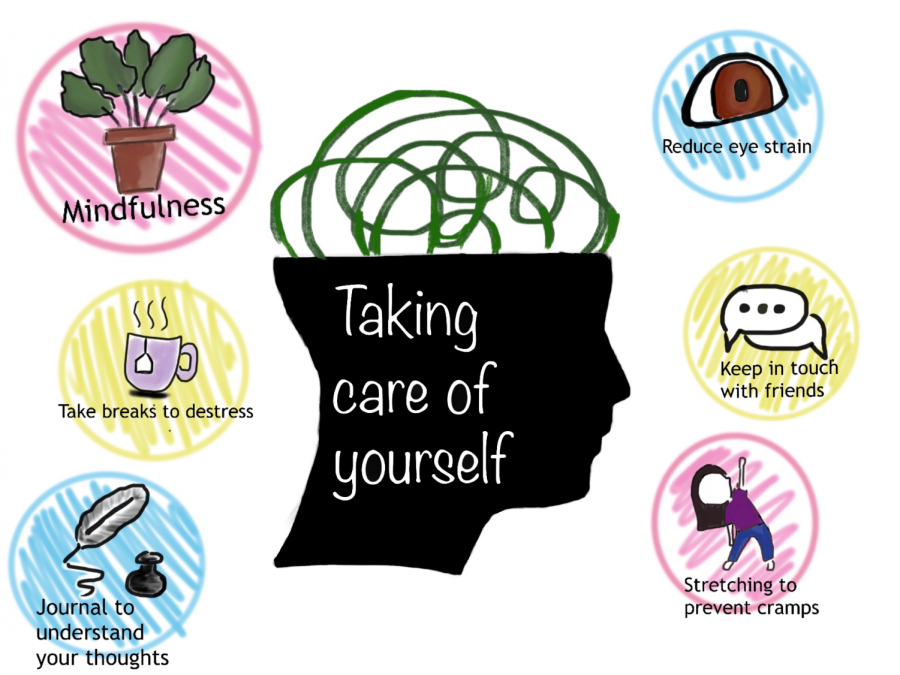Taking care of yourself during quarantine
Graphic illustration by Lina Mezerreg
Here are some key ways to combat the negative side effects of the coronavirus lockdown.
December 4, 2020
Lockdown has given everyone an abundance of work and worries, resulting in seemingly trivial matters like personal welfare often being neglected. But health and well-being should not be disregarded, especially during a time that reads more like a crazy plot-twist than a reality. Now more than ever, they should be prioritized.
With everything moved online, from school to leisure, there has inevitably been more screen time that has increased eye strain. Many have opted for blue light glasses—glasses with lenses that are specifically designed to filter out the harmful blue light that devices emit. Computer programs, such as f.lux, adjust the light emitted by the screen to a warmer, yellow tint that helps balance out the amount of the blue light emitted, especially in the evening. Another effective way to combat sore eyes and overuse would be to take periodic breaks. Simply looking up and focusing on a spot about 20 feet away for 20 seconds every 20 minutes can significantly minimize screen fatigue.
Another problem that has arisen from online learning are neck cramps. Tense neck, back and shoulder muscles may be the results of odd sleeping positions, but often are caused by hunching over a laptop all day and disregarding the discomfort caused by poor posture. These uncomfortable situations emphasize the importance of correct form. When sitting, whether it be during class or an impromptu study session, proper posture is not only important for preventing momentary discomfort like cramps, but also for boosting one’s mood and productivity. A straight back and neck, both of which preclude slouching over a keyboard, are important to maintaining proper posture. There should be approximately 20 inches between eyes and the screen, and feet should be flat on the ground with thighs parallel to the ground.
To relieve neck cramps and sore backs, one of the most common ways is shoulder shrugs. These do not need to be full shoulder rotations, but small motions of lifting and lowering one’s shoulders can be effective. Other methods involve turning the head periodically from side to side, or up and down. Basic tricep and neck stretches, such as pulling one’s arms behind their head, are also helpful. Additional stretches to deal with shoulder tension can be performed while sitting down, but standing up while doing them may be helpful in preventing overall muscle stiffness. A full body stretch can involve tilting from side to side and leaning as far as possible in each direction: right, left, forward and back.
But health and well-being includes physical well-being and comfort in addition to emotional wellness. Although there are a plethora of stressors due to the current global pandemic, there are also a wide variety of ways to deal with them.
One way to deal with increased emotional pressure is breathing exercises. It is a familiar method that focuses on keeping a steady cadence for each breath. A common breathing technique is the “4-7-8.” The method is simple, as it involves inhaling quietly through the nose for a count of four, and then holding that breath for a count of seven before exhaling completely through the mouth for an eight-count.
Another technique that can be used is to practice increasing awareness of surroundings. Counting down from five, a person lists things that can be observed with all five senses. At five, one observes five things that can be seen. At four, it’s four things that can be touched. At three, it’s three things that one can hear. At two, one focuses on two items that can be smelled, and at one, brings their attention to one item that can be tasted. This approach helps reinforce a sense of calm and groundedness by creating a strong connection with reality.
There are many other activities one can partake in to relieve stress based on individual hobbies and interests, including journaling, taking a shower, going on a walk, listening to music, talking with friends or reading a book. This list is inexhaustible, as the only goal is to find an activity that aids in managing stress.
Quarantine is not easy because it introduces so many unprecedented struggles. Times like these can push a person to grow, but taking care of one’s physical health and emotional well-being is extremely important to growth as well.




























































